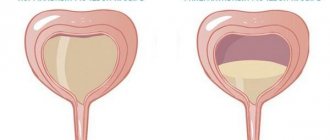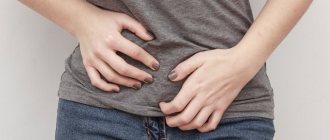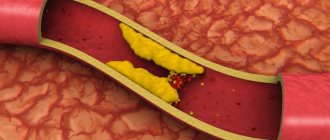Diagnostics
To establish the correct diagnosis, the doctor needs to conduct a thorough examination of the patient, prescribe tests, and only based on the results obtained will it be possible to determine the form and type of the disease. Depending on the indications, the following types of diagnostics may be prescribed:
- Palpation (palpation) is a superficial examination by a specialist, helps to assess the condition of the internal organs and determine the degree of abdominal pain.
- Ultrasound of the peritoneum - assesses the functioning of all organs of the gastrointestinal tract.
- Clinical analysis and blood biochemistry. The degree of inflammation, hemoglobin level, and the presence of Helicobacter pylori bacteria are determined from the blood.
- General urine analysis.
- Computer or magnetic resonance imaging is a study of the gastrointestinal tract for the presence of neoplasms.
- Fibrogastroduodenography. A procedure in which a thin tube (gastroscope) with LEDs and a mini camera is inserted into the intestines. The examination allows you to perform chromoscopy, examine the mucous membrane of the stomach and intestines, detect inflammation and signs of mucosal atrophy.
- Morphological analysis - examination of a mucosal fragment under a microscope.
- Gastrochromogastroscopy. Prescribed for heaviness and bloating after eating. This procedure helps the doctor clarify the level of acid-forming activity of esophageal secretions and assess the scale of atrophy. Diagnosis is carried out using an endoscope and a special Congo-ort dye (acid-base indicator).
- Fibercolonoscopy (FCS) is an endoscopic examination with a fibercolonoscope (a long elastic probe) used to assess the condition of the large and small intestine.
- Enteroscopy (intestinoscopy) – assessment of the condition of the gastric mucosa using an endoscope.
- Endovideocapsule (capsule endoscopy). The patient swallows a special capsule (equipped with one or two mini-video cameras), which passes throughout the digestive tract and takes pictures.
- Ultrasonography.
- Duodenal sounding.
- Fibroesophagogastroduodenoscopy (gastroscopy or FEGDS) is an endoscopic examination (visual examination) of the walls of the gastrointestinal tract with a gastroscope.
- Coprogram is a method for assessing the performance of the digestive organs.
- X-ray of the stomach is an X-ray examination performed using a contrast agent (barium).
- Urease breath test for the presence of Helicobacter pylori bacteria
- Immunological and molecular testing to determine the presence of parasites in the body.
- Stool culture for dysbacteriosis.
Additional symptoms
Often, heaviness and bloating occur after eating. Eating heavy foods (rich in fats and proteins) puts a lot of stress on the body, slowing down the digestive process. Food based on simple carbohydrates can provoke fermentation in the intestines. When discomfort in the abdomen is observed after eating, the clinical picture may have the following signs:
- belching of air, sometimes with a taste of previously eaten food;
- flatulence;
- significant increase in abdominal size;
- disturbances in the functioning of the gastrointestinal tract.
In the presence of gastroenterological diseases, symptoms acquire additional manifestations. This:
- nausea;
- bad breath;
- vomit;
- dizziness;
- bloating;
- temperature increase;
- heaviness in the left side of the abdomen;
- poor appetite or its complete absence;
- general weakness;
- unstable stool (prolonged constipation, then sudden attacks of diarrhea);
- heartburn;
- feeling of being full even after consuming a minimal amount of food;
- rumbling in the stomach;
- constant heaviness;
- pain (of varying nature and duration) in the stomach after a meal;
- sudden weight loss.
Doctors identify some signs that make it necessary to urgently seek help from a medical facility or call an ambulance. They may indicate serious problems with the intestines or stomach. Self-medication in this case is completely excluded in order to avoid worsening the situation. The main symptoms are:
- frequent vomiting;
- increased temperature to the maximum;
- convulsions, fainting;
- in pregnant women - urine with blood;
- asymmetrical (on one side) bloating;
- fever, chills, cold sweat;
- constant diarrhea, in which impurities of blood or pus are present in the stool;
- severe spasmodic pain in the abdomen.
- sudden loss of body weight;
- severe and unbearable pain in the abdominal area.
Intestinal diseases
With diseases of the small intestine, the stomach hurts near the navel or in the middle section. Gas formation is increased and occurs 2-3 hours after eating, when food has entered the intestines. Painful sensations accompany bloating, transfusions in the lower sections, and flatulence.
Gastric dyspepsia (difficulty in digestion). Symptoms: heaviness after eating, unpleasant aftertaste, bad breath. In the morning, nausea, belching. The stomach is rumbling, swollen in the upper part. The cause of exacerbation is certain foods.
Intestinal dyspepsia is associated with insufficient secretory activity of the stomach, pancreas, and lack of bile. Causes: poor diet, predominance of protein or carbohydrate foods, intestinal infection. In the intestines there is transfusion and rumbling, bloating, flatulence, loose stools.
Enteritis. The stool is loose. In severe forms of the disease, food absorption is impaired, the patient loses weight, and hair falls out. Irritability, frequent mood swings. The stomach is swollen and hurts. In the chronic form, the symptoms are enhanced by drinking cow's milk.
Colitis. In the colon, the removal of water from stool is impaired, causing loose stools. The spasm compresses the inflamed area of the intestine, complicating the passage of feces - the cause of pain, bloating, and constipation.
Intestinal dyskinesia. Intestinal motor function is impaired, spasm. The lower abdomen is swollen and painful, rumbling and transfusion. The cause of the attack is a tight belt, incorrect posture, heavy food, excessive excitement. Constipation predominates, and defecation is accompanied by a feeling of incomplete emptying.
Mesenteric ischemia. Older people are more likely to suffer from blood flow disorders. The mesenteric arteries of the small or large intestine are narrowed or blocked, which is common in atrial fibrillation. Their narrowing is the cause of pain in the middle and upper part of the abdominal cavity when the intestines contract.
Celiac disease. Hereditary inability to digest gluten is the cause of the accumulation of harmful substances in the small intestine. They disrupt digestion and metabolic processes, and increase gas formation. The body is dehydrated. Anemia, caries.
When harmful substances accumulate in the gastrointestinal tract, the defenses spend a lot of effort to neutralize their negative effects. The body gets tired faster, resists infections less well, and gets sick more often. Bad breath, bloating due to gas formation.
The activity of pathogenic microflora and their waste products also contribute to increased gas formation.
A healthy body is inhabited by about 15 types of microorganisms, of which 7 species are in the intestines: Giardia, Trichomonas, Balantidia, Cryptosporidium. Infection occurs through food, water, and household contact.
Giardia damages the mucous membrane of the gallbladder. Giardiasis is the cause of swelling and bloating. Nausea, loose stools or constipation, pain at the top and in the umbilical region.
Ignoring these symptoms is the cause of the development of gallbladder dyskinesia (motility disorders), cholecystitis (inflammation of the gallbladder).
The cause of bloating in biliary dyskinesia, chronic cholecystitis and hepatitis is a violation of the outflow of bile. Pain in the right hypochondrium, irritability. Fatty foods cause loose stools.
With amoebic dysentery, the abdomen is swollen, the cause is damage to the colon mucosa, it is accompanied by abundant mucus and pus. The processes of digestion and absorption, and removal of waste from the intestines are disrupted. It swells, I often want to go to the toilet, my stool is loose. Nausea, vomiting, chills, weakness.
Rotavirus infection (“intestinal flu”) affects the gastrointestinal tract. In the initial stage, the stomach growls and is swollen. Penetration of rotavirus into the duodenum and upper small intestine damages the mucous membrane, disrupts the production of enzymes and absorption processes. Fever, vomiting. Diarrhea is a cause of dehydration.
Long-term treatment with medications reduces intestinal barrier function.
The predominance of staphylococci is the cause of fever, chills, pain, and bloating, especially along the large intestine. The stool is frequent and liquid, with mucus, blood and pus.
If the cause of dysbacteriosis is Candida and Aspergilla fungi, pain in the navel area, heaviness and bloating. The stool is liquid, bloody and foamy, with the release of films and lumps. There is no appetite, the tongue is crimson.
Aspergilla is the cause of intestinal dysbiosis in gastritis with high acidity, after long-term use of antibiotics (tetracycline). Nausea, rashes on the mucous membranes, swelling, moldy taste in the mouth. Due to severe intoxication, the state after eating is similar to intoxication.
Dysbacteriosis causes a deficiency of vitamins, especially group B:
- sleep disturbance (B1 deficiency);
- stomatitis, hair loss, nail changes (B2 deficiency);
- impaired hematopoietic function, damage to the sheath around nerve fibers, numbness of the limbs, impaired coordination of movements (B12 deficiency).
An acute form of gastritis - inflammation of the gastric mucosa - causes fullness in the stomach, bloating, loose stools or constipation.
Warning symptoms that require you to see a doctor
Short-term heaviness in the epigastrium and bloating are not dangerous and do not require special treatment. Such symptoms disappear after the provoking factor is eliminated. If the condition worsens or accompanying complaints appear, you should consult a doctor.
Warning signs:
- pain in the epigastrium, around the navel, in the hypochondrium or lateral abdomen;
- prolonged heartburn;
- difficulty swallowing food;
- long-term bowel disorders: persistent diarrhea or constipation;
- increased body temperature;
- nausea and vomiting;
- weight loss;
- the appearance of impurities in the stool (pus, blood, food debris).
The necessary assistance can be provided by a physician, general practitioner, gastroenterologist or abdominal surgeon.
How to normalize stool in an adult due to constipation and bloating
In order to prevent the symptom of a “lazy” stomach, physical activity is increased. Doctors recommend walking in the fresh air for at least 2 hours daily and therapeutic physical education (PT).
Home methods:
- When brewing tea, add cumin seeds;
- 2 tbsp. l. pour a glass of boiling water over the dill and leave to brew for 30 minutes. When the liquid has cooled, strain. After cooling, divide the decoction into several parts and drink it throughout the day. Dill water is recommended for babies who have colic;
- carrot seeds are harvested and dried in the oven. The raw materials are crushed to a powdery state and taken if the stomach is bloated;
- In the morning on an empty stomach, eat a clove of garlic;
- Prepare the millet and place it in cold boiled water. Press the grains with your hands until the water turns white. The liquid helps normalize stools and should be consumed within 24 hours;
- drink herbal decoctions (thyme, chamomile);
- prepare ginger tea: after preparing the drink, add half a teaspoon of ginger.
Traditional medicine is taken in combination with basic treatment and changes in diet.
Exercises for constipation:
- In the “lying” position, do the “bicycle” exercise.
- Do not change the position, bend your legs at the knees, press them to your stomach.
- Bend your legs at the knees, bring your knees together and spread them apart.
- We change the starting position. In the “standing” position, as you inhale, stretch your stomach, and as you exhale, pull it in.
- Walk on the floor, raising your knees as high as possible.
What diseases can lead to the development of the problem?
The most common cause of heaviness in the stomach after eating food is an unhealthy diet, bad habits and poor diet. However, if a problem bothers a person for a long period of time, it is possible that some pathologies in the body led to its development. The most likely causes of diseases include:
| Disease | Characteristic |
| Gastritis | The pathology is inflammatory in nature and manifests itself as a result of the systematic negative impact of unfavorable factors (mechanical, chemical, thermal, bacterial damage) on the gastric mucosa. As a result of such exposure, the epithelium is injured, clear lesions appear on it, and the functionality of the organ is lost. |
| Peptic ulcer | The disease is accompanied by deep damage to the gastric mucosa, resulting in pronounced painful ulcers appearing on its walls. Most often, the disease develops against the background of untreated gastritis. The patient experiences very unpleasant sensations. This is a pain syndrome that occurs immediately after eating, or a few hours after a meal, or during fasting. There is a urge to vomit and stool disturbances. |
| Pyloric stenosis | The opening connecting the stomach and intestines is called the pylorus. Normally, the diameter of this opening is quite wide, which allows food to move freely from the stomach to the intestines. With the development of certain diseases, such as malignant or benign tumors, ulcers, the pylorus lumen becomes narrower. As a result, food moves more slowly and stagnates, which leads to a feeling of heaviness in the lower abdomen |
| Liver pathologies | If the cause of heaviness in the stomach is liver pathology, the patient faces the following problems: yellowness of the skin and sclera, a feeling of fullness in the lower abdomen, accompanied by discomfort, deterioration of the condition, the appearance of specific rashes on the skin, darkening of stool and urine. |
| Neoplasms in the stomach | The appearance of heaviness in the abdomen is caused by the formation of malignant or benign tumors in the stomach cavity. The most dangerous situation is the development of carcinoma. When tumors appear, the patient is worried about such complaints as a feeling of rapid satiety, heaviness, pain, deterioration in general condition, loss of body weight, even to the point of exhaustion of the body. |
| Inflammation of the pancreas | This organ produces a large number of enzymes that make up the gastric juice. With the development of inflammation, the secretory function of the pancreas is lost, and accordingly, the composition of the gastric juice changes. Food is less easily digested and stagnates in the stomach, leading to a feeling of heaviness. |
| Parasitic infestations | Worms and other parasites that penetrate the human body, in particular the digestive tract, damage their tissues. As a result, digestive function is lost, food stagnates in the stomach or intestines for a long time. |
Expert opinion
Shoshorin Yuri
General practitioner, site expert
All the diseases mentioned above pose a serious danger to the patient's health. Heaviness in the stomach is a characteristic symptom of all these pathologies, which means that if the patient constantly feels fullness and pain, it is necessary to undergo an examination as soon as possible and identify the cause of the problem.
Pain prevention methods
To prevent pain in the lower abdomen in women and men after lifting weights, you need to avoid excessive loads. This is especially true for girls. Moderate physical activity will help strengthen muscles and avoid further unpleasant discomfort.
The problem of diseases that cause pain requires much more serious methods of prevention: from hygiene and nutritional rules to regular preventive examinations by doctors.
Pain in the lower abdomen after lifting weights is equally likely to occur in women and men. However, the stronger sex is better able to cope with such loads, and in women, due to the position of the uterus, tubes and ovaries, sudden rises can lead to pathologies.
Folk remedies
Coltsfoot. Protects the intestinal walls, reduces inflammation, eliminates the causes of gas formation and bloating.
- Brew 2 tbsp. coltsfoot leaves with a glass of boiling water, leave for an hour, strain.
Take 1 tbsp. half an hour before meals.
Plantain:
- Brew 1 tsp. dried plantain leaves with a glass of boiling water, leave for 4 hours, strain, add 1 tbsp. honey
Take 1 tbsp. immediately after eating. Store in a cool, dark place for no more than two days.
Bird cherry, propolis:
- Brew 1 tsp. dried bird cherry fruits with a glass of boiling water, simmer over low heat for 15 minutes. After 30 minutes, add 30 drops of 20% propolis tincture.
Take 100 ml half an hour before meals.
Remedy for giardiasis:
- Wash and peel 12-15 g of horseradish and garlic, mince.
- Pour a glass of vodka, leave for 10 days, shake every day, strain.
Take 1 tbsp. Half an hour before meals, drink water.
Recipes for cholecystitis:
- Mix carrot and beet juices, cognac, and honey in equal parts.
Take half a glass half an hour before meals. Store in a cool, dark place.
- Brew 1 tsp. plantain leaves with a glass of boiling water, leave for 10-15 minutes, strain.
Drink in small sips within an hour.
Cabbage juice or salad. Treats causes of bloating, stomach and duodenal ulcers:
- Take 1-2 tablespoons of fresh juice. half an hour before meals.
- Gradually increase the volume to 1/2 cup.
The optimal single serving of fresh cabbage salad is 100g. Chew the leaves thoroughly. Overeating causes heartburn and bloating.
Regular course treatment with cabbage juice lasting a month helps eliminate belching and inflammation in the small and large intestines.
St. John's wort is astringent, has an anti-inflammatory effect, and is used in the treatment of diseases of the stomach and intestines.
- Brew 1 tsp. herbs with a glass of boiling water, strain after 5 minutes.
Take 2-3 glasses a day for several weeks.
- Grind 1 tbsp. fresh flowers,
- Pour 10 tsp. olive oil, place in a light glass container.
- Do not cover, leave for 5 days in a warm place for fermentation, shake occasionally.
- Close the container and expose it to the sun until the contents turn red (about 1.5 months).
- Strain the finished oil
Take 1 tsp. 2 times a day for a mild choleretic effect, to normalize the activity of the stomach, excited due to nervous shock. Store the oil in a dark place.
Long-term use of St. John's wort is a cause of exacerbation of gastritis. With a stomach ulcer it causes pain and cramps.
Remedies for constipation. Friable porridges are useful: buckwheat, millet, pearl barley. Avoid strong tea, coffee, chocolate, thick cereals, white bread, and pasta. Include fresh vegetables and fruits rich in fiber in your diet, except for the astringent blueberries, lingonberries, pomegranates, and quinces.
- Take activated carbon at the rate of 1 tablet per 10 kg of weight up to 3 times a day.
- Severe constipation is treated with a salad of grated cabbage and apple, seasoned with cabbage juice.
Eat salad in any quantity every other day.
Contraindications for treatment with cabbage: pancreatitis, enteritis, colitis, exacerbation of gastritis, increased peristalsis, spasm of the stomach and intestines, biliary tract. The glycosides in mustard oil provoke goiter.
How to get rid of heartburn and flatulence
To get rid of unwanted symptoms, you need to adjust your diet, give up bad habits and choose medications against heartburn and flatulence. If gastrointestinal pathologies are identified, they undergo a course of specialized treatment.
Diet
Treatment of heartburn and flatulence should begin with simple rules of eating:
- eat as often as possible and in small portions; Do not overeat under any circumstances, get up from the table with a slight feeling of hunger, which soon passes;
- do not eat in a hurry or on the go;
- do not have dinner before bed, do not go to bed immediately after eating;
- follow the order of food intake: first liquid dishes, then vegetables, then protein foods;
- do not eat raw vegetables and fruits immediately after the main meal;
- do not wash down fatty foods with water;
- regularly (once a month) arrange fasting days to cleanse the intestines;
- Drink a glass of raw water between meals.
Diet
While a burning sensation in the chest or attacks of flatulence appear after eating, you should avoid the following foods:
- coffee, chocolate, cocoa;
- mayonnaise, mustard, ketchup;
- fatty pork, lamb, duck;
- tomatoes, cabbage, beans, peas;
- onion garlic.
Diet for the treatment of bloating and heartburn recommends:
- have breakfast with cereals - carbohydrate foods with a lot of fiber are good for the intestines and keep you feeling full for a long time;
- dine on protein foods (fish, meat) in combination with vegetables;
- for an afternoon snack, eat a vegetable or fruit dish;
- for dinner - protein foods, eggs, dairy products, cheese.
Eating seeds (flaxseed, sunflower, pumpkin) helps with heartburn and flatulence. To prevent these symptoms, it is necessary to stop smoking, reduce alcohol consumption, and increase physical activity. It is very important to start fighting overeating and extra pounds, since obesity is always accompanied by digestive problems.
Medication assistance
For acute attacks of heartburn and flatulence, medications with different mechanisms of action are indicated.
Antacids
Antacids neutralize hydrochloric acid that has entered the esophagus, act for 2 hours, relieve symptoms of burning, nausea, and belching:
- Gastacid, Amagel, Phosphalugel - aluminum-based drugs relieve heartburn, but cause constipation;
- Rutacid, Rennie - contain magnesium, side effect - diarrhea.
Unconventional methods of treatment
Herbal teas made from chamomile, mint and St. John's wort are good for bloating and flatulence. To prepare a healing drink, add hot water to the herbal mixture and leave for 10 minutes. You need to take tea 3 times a day.
The following spices and herbs help eliminate excess gas formation: cardamom, cumin, ginger, dill, fennel and parsley. They should be added to dishes that are present in the daily diet.
Please note that traditional medicine methods cannot be used as an independent remedy for bloating and bloating. As a rule, they come in combination with basic drug treatment, which is prescribed by an experienced doctor.
Bloating and abdominal discomfort are common. As a rule, it is associated with poor diet and unhealthy lifestyle. However, in some cases it can serve as a signal about the development of a serious disease in the body. Therefore, if abdominal bloating is regular, you should immediately consult a doctor.
Upper abdominal pain and bloating are related to each other. In most cases, both of these ailments are symptoms of indigestion. But there are other reasons.
There are many factors that can manifest as pain in the upper abdomen. Let's try to highlight the most common of them:
1. angina pectoris (reduced blood flow to the heart); 2. appendicitis; 3. inflammation of the bile duct; 4. inflammation of the gallbladder; 5. inflammation of the duodenum; 6. formation of gallstones; 7. gastroesophageal reflux; 8. heart attack; 9. hepatitis; 10. intestinal obstruction; 11. difficulty in blood flow to the intestines; 12. lymphoma; 13. pancreatitis; 14. peptic ulcer; 15. pneumonia; 16. aortic aneurysm; 17. mucous colitis; 18. constipation; 19. aerophagia.
Bloating is another common manifestation of several types of digestive problems. This is a feeling of fullness in the stomach, a feeling of heaviness in the stomach. Here are the main causes of bloating identified by doctors:
1. premenstrual syndrome; 2. alcohol abuse; 3. oral contraceptives; 4. processed food; 5. protein deficiency; 6. abuse of carbonated drinks; 7. lactose intolerance; 8. fatty foods; 9. mucous colitis; 10. celiac disease; 11. Crohn's disease; 12. colon cancer; 13. slow digestion; 14. obesity; 15. hasty eating; 16. candidiasis.
Treatment of pain in the upper abdomen
If the pain is not accompanied by symptoms such as chest pain, fever, vomiting, or difficulty breathing, it can be managed at home. Place the heating pad on your stomach and lie with it for a while. A warm bath can relieve pain. But if the pain does not go away, but on the contrary, worsens, delay in seeking medical help is fraught with unpleasant consequences. Therefore, consult a doctor as soon as possible and fix the problem.
Treatment of bloating
Bloating is a less serious symptom than abdominal pain, so you may want to try some home remedies before seeing a doctor. The first remedy is to develop the habit of eating slowly and chewing every bite of food thoroughly. Eating small, frequent meals is a big help in preventing bloating. Experts recommend eating 6 times a day.
Eat light, warm broths and vegetables. Buns, cookies, bread, and pastries should be avoided if you suffer from frequent bloating. Avoid spicy foods. Drinking warm water frequently throughout the day can help relieve stomach pain and bloating. Avoid coffee, tea and caffeine-based drinks.
Reduce your fiber intake to 25 grams daily. This amount of fiber gives balance to the digestive system. Don't forget about physical activity. This is the simplest and most effective home remedy for treating bloating. Even a 30 minute walk after eating helps reduce the severity of this condition.
And the last piece of advice is to undergo a medical examination if, even after following these recommendations, your condition does not improve. The problem may be too serious.
Abdominal pain and bloating are often symptoms of indigestion. But if the symptom persists for more than a week and worsens, seeking medical help is essential.
It's very unpleasant when it swells. The cause of discomfort is a feast, certain foods. If your health is good, the reason for bloating is simple: digestion has produced gases that ask for release. In difficult cases, bloating and other symptoms signal a disease.
Big hard belly in men
After forty years, you can often notice a hard stomach in men. Some representatives joke that it is a “bundle of nerves,” but stress is not always the cause of compaction of the mass.
Much more often, fat builds up due to overeating, low physical mobility and addiction to foamy drinks. But there are other options for a man’s stomach becoming elastic and overly dense.
They should be examined in more detail.
Causes of a bloated and hard belly in men
The effect of muscle fiber stiffness has more than one factor that causes this phenomenon. The causes of a hard belly in men can be caused by systemic disorders of the internal organs. A feeling of fullness appears after overeating, drinking too much sweets, or carbonated drinks. No action is required, just moving around is enough for the condition to improve.
Important! A constantly swollen belly can be a sign of lumbar lordosis - a forward-facing curve. The bulge appears due to excess weight - the spinal defect is diagnosed by examination by a specialist, who will prescribe appropriate treatment.
Dysbacteriosis
The intestinal microflora is populated by many bacteria necessary for the normal functionality of the gastrointestinal tract. Due to the use of antibiotics, poor nutrition, and stress, bacterial balance is disrupted.
Food that enters the stomach is not digested, rots and causes fermentation. The result is a hard, bloated belly.
Failure to treat dysbiosis will lead to pathological consequences for the entire body, one of which is toxic poisoning by fermentation products.
To avoid this, you should adjust your diet, take probiotics and for some time go on a diet limiting sweets, fatty and other foods that cause discomfort.
Intestinal blockage
The first symptom is pain in the abdomen. There may be a feeling of hardening in some part of the intestines, stool retention occurs, and gases do not pass away. Painful sensations of varying intensity and character increase and are localized. The result is a hard, elastic stomach, the causes of blockage are different: from poor nutrition to pathological changes in the functioning of internal organs.
If constipation does not go away for a long time, home remedies (enemas) and medications do not help, you should consult a doctor. It will require examination and identification of the provoking factor, then prescribed treatment.
Other causes of bloating
If a normally healthy patient is faced with the pathology of a tight abdomen, and there is not a single sign listed above, you should look for another reason why men have a hard abdomen. There are several of them:
- Severe stress and anxiety. Nervous breakdowns disrupt the functioning of the gastrointestinal tract, which can cause bloating. It is best to change your diet, lighten it and take a sedative.
- Appendicitis. Often the symptoms are vague and there is normal pain on the right side, no temperature. If the symptom does not go away within an adequate period of time, you should consult a doctor.
- Pancreatitis is another reason why the stomach is like a drum in men. The first symptom is pain in the navel area spreading to the abdominal area. Then vomiting begins, the stomach swells, and sometimes diarrhea appears.
- Acute cholecystitis is manifested by pain in the heart area, increased body temperature, and a man may sweat profusely.
- A strangulated hernia also leads to tightening of the abdominal muscles. Symptoms: sharp pain in the hernia area, spreading in breadth. If the hernia cannot be repaired, immediate assistance from a surgeon is required.
- A very tight abdomen is a symptom of a peptic ulcer of the stomach and/or duodenum. When perforation occurs, vomiting of blood begins, and the stool turns black. The patient may lose consciousness. Failure to treat will result in death.
- Due to injury to internal organs, a bloated abdomen may also appear.
Important! The pre-infarction state is accompanied by pain in the stomach and swelling of the abdominal muscles. You should remember this if you have heart problems. Self-medication is ineffective; emergency medical attention is needed.
A hard stomach in men occurs due to abscesses, abdominal ascites (dropsy), and disruption of the blood vessel located on the abdominal wall. There are many reasons, and in order to prevent the development of the disease, you should be attentive to the symptoms that appear.
In what cases is emergency medical care necessary?
When you should not look into the reason why your stomach is hard, but call an ambulance immediately:
- attacks of acute pain anywhere in the body;
- pain in the right hypochondrium, accompanied by nausea and fever;
- pain with changes in skin color in the area of the lesion;
- heaviness, discomfort in the lower abdomen, a feeling of hardness in the intestines;
- severe pain accompanied by bloody stools or the release of bile;
- bloody vomiting, hardness in the abdominal muscles.
If these problems occur, you should not self-medicate. It is advisable not to take painkillers or other medications. The onset of relief is a temporary factor, but it blurs the clinical picture of the disease. It will be more difficult for the doctor to determine why the stomach is tight; the reason may be unclear, which will affect the further course of treatment.
A large belly in men is quite common, and it is unlikely that any of the owners of such “decoration” are truly satisfied with their appearance.
There are a variety of excuses, but the fact remains: a “beer belly” spoils health, significantly limits the brightness and richness of life in all its manifestations and, of course, makes the owner not very attractive to ladies.
Let's figure out why men grow a big belly, why it is dangerous and how to effectively get rid of it, regaining your slimness, health and attractiveness in the eyes of the opposite sex.
- Causes of a big belly in men
- Why is a big belly dangerous in men?
- 5+ ways to get rid of beer belly
Causes of a big belly in men
A large and firm belly in men is popularly called a “beer belly.” Why ?
This striking association was replicated by popularizers of a sober lifestyle, who insisted on the extreme dangers of beer.
Of course, there is nothing good about a high-calorie, intoxicating drink, but its danger was clearly exaggerated.
The reasons why a man may have a big belly are varied:
- Eating excessive amounts of food. This can be partly blamed on the stereotype that “boys should eat a lot”, partly on the fact that many men are lazy to eat right and are addicted to fast food and other junk food, partly on women who are only happy to feed their beloved husband/boyfriend/son full, even if dinner came at nine o'clock in the evening. Beer, beloved by many men, not only is also a high-calorie product, but also stretches the walls of the stomach, provoking an even greater appetite - and an ever-increasing amount of food. Also, the origins of the problem may be hidden in eating disorders (psychological genesis) or malfunctions in the functioning of receptors associated with the perception of hunger (biological genesis).
- A sedentary lifestyle or lack of physical activity in general. Physical inactivity, especially if there is a rich menu, is a sure way to accumulate body fat. And weak tone of the abdominal muscles leads to the fact that the stomach does not have a strong “corset” that can contain fat - which is why a big belly sometimes appears so quickly.
- Age. The older a person is, the more his body’s metabolism slows down, which often results in the rapid growth of a “beer belly” after 30-40 years. In addition, as men age, testosterone levels decrease, which “stops” the formation of excess fat.
- Hormonal disorders. Testosterone may decrease not only due to age-related changes. Extra pounds also reduce the production of the male hormone, and active consumption of beer stimulates increased production of estrogen - the so-called. a female hormone that increases the production of subcutaneous fat. Various disorders that are not related to diet choices and weight may also occur - for example, acquired adrenal dysfunction.
Source: https://zhivizdravo.ru/info/bolshoj-tverdyj-zhivot-u-muzhchin/
Review of effective symptom management remedies
| Name of medicine | Pharmacological group | Peculiarities |
| Mezim (Pancreatin) | Enzyme-containing drugs | Contains a mixture of digestive enzymes isolated from the pancreas of pigs. The process of breaking down proteins, fats, and carbohydrates improves. The drugs are recommended for patients after surgical interventions, for chronic stomach diseases, and dietary errors. |
| Linex, Bifiform (for children), Licidofil | Probiotics | They normalize intestinal microflora and provide recovery from dysbacteriosis. |
| Lactulose syrup, Medulak, Forzhekt, Duphalac, Lactofiltrum | Laxatives | Feces soften and pass out faster, intestinal motility improves, and digestion improves. Approved for use by adults and children, lactulose syrup is the only approved drug against constipation in children under one year of age. |
| Trimedat, Neobutin | Antispasmodics | Tablets for the intestines against bloating regulate intestinal motility and restore the muscles of the gastrointestinal tract. |
| Espumisan (suspension), Plantex | Carminatives | Preparations based on simethicone prevent the formation of gas bubbles. |
| Activated carbon, Polysorb, Enterosgel | Enterosorbents | Bind toxic substances by adsorption. |
Treatment of constipation:
- For constipation with flatulence, bloating, rumbling, first use is to cleanse the stomach by taking laxative medications and administering enemas.
- Restoration of intestinal motility with antispasmodic medications.
- Taking prophylactic medications to prevent relapses.
Treatment of flatulence and bloating:
- Carminative drugs that prevent the formation of gases and enterosorbents are prescribed.
- Taking enzyme-containing products to speed up the digestion of food.
- Taking probiotics to restore the gastrointestinal microflora.
Treatment is carried out subject to prior consultation with a doctor. Uncontrolled use of tablets leads to addiction and “lazy” stomach syndrome. An overdose of laxatives provokes diarrhea and diarrhea. Prescribe medications with caution for hemorrhoids and rectal fissures.
Approximate diet
It is important to eat at least 5 times a day, but in small portions and at the same time. To create a diet, you need to choose 1 of the proposed options for each meal:
- Breakfast: Milk porridge, cottage cheese casserole, carrot salad;
- Lunch: Cucumber salad, baked fruit, some dried fruit;
- Lunch: Vegetable or milk soup, fish or meat cutlets (from dietary meats) with a side dish of cereals or vegetables;
- Afternoon snack: Drinking yogurt or berry jelly;
- Dinner: Stewed fish with carrots, vegetable salad, boiled chicken breast.
Causes of heaviness in the stomach after eating
When a symptom such as heaviness in the stomach appears, the reasons for the development of this problem can be very diverse. The most common adverse factors are:
- Diet errors. For example, if a person consumes an excessive amount of fatty foods, fried foods, semi-finished products, which contain a large number of preservatives, flavor enhancers and other chemicals that negatively affect the functioning of the digestive organs;
- Wrong diet. It disrupts the normal functioning of the digestive system, when the gastrointestinal tract is forced to work under heavy overload. This is, for example, alternating long periods of fasting with excessive food intake, night meals;
- Insufficient chewing of food, haste when eating. Poorly chewed food enters the stomach in large pieces, making it more difficult for the organ to digest it, and the digestion process takes a lot of time. This leads to a feeling of heaviness in the stomach, as well as to the appearance of other unpleasant clinical manifestations;
- Consumption of expired, stale, low quality products. In this case, there is a high risk of developing food poisoning with all the manifestations characteristic of this situation, which negatively affect the functioning of the gastrointestinal tract and can be dangerous to health and life;
- Lack of physical activity. It is known that physical activity stimulates the functioning of the digestive system; lack of exercise has an adverse effect on the functioning of the stomach and intestines, and on the condition of the entire body as a whole;
- Lazy stomach syndrome (dyspeptic disorders). The development of this problem is caused by both poor nutrition and congenital anomalies of the gastrointestinal tract, as well as genetic disorders;
- Pregnancy. In the process of bearing a child, the female body undergoes a number of serious changes. These are, first of all, changes in hormonal levels, the development of toxicosis, compression of the peritoneal organs as the fetus grows;
- Adolescence, when various changes occur in the child’s body;
- Psychological problems, in particular, excessive emotionality, anxiety, tendency to stress and worry;
- Addiction to alcohol and cigarettes;
- Long-term use of certain types of medications, and, as a result of this, the development of dysbiosis and difficulty digesting food.
Associated symptoms
A feeling of heaviness in the abdomen is always accompanied by other symptoms. The manifestation of symptoms directly depends on the cause and the presence of any diseases.
Unpleasant symptoms may include the following:
- heaviness in the stomach and belching;
- the occurrence of pain in the right abdominal region. In this case, the intensity can be varied;
- nausea and vomiting;
- bloating;
- heartburn;
- diarrhea. May be followed by prolonged constipation;
- a bursting feeling in the stomach;
- general weakening of the body;
- temperature increase;
- dizziness;
- decreased or complete lack of appetite;
- rumbling and frequent urge to pass feces.
In addition to all this, heaviness can occur both in the morning and evening hours. This process indicates overeating immediately before going to bed.
Doctors also identify symptoms that require immediate medical attention. It could be:
- repeated vomiting;
- high body temperature;
- persistent diarrhea. In this case, the feces will have a greenish tint;
- sudden loss of body weight;
- intense and persistent pain in the abdomen;
- lack of appetite.
These symptoms are especially dangerous for children under 5-6 years of age. They become dehydrated quite quickly, which can lead to death. If a person experiences even one symptom, they should immediately consult a doctor or call an ambulance.
Signs of heaviness in the abdomen can occur in expectant mothers at any stage of pregnancy. Up to 12 weeks, an unpleasant symptom signals the presence of toxicosis. As the baby grows, the uterine cavity begins to compress the internal organs. In most cases, severity for pregnant women is not considered dangerous. But if pain in the abdomen, bloody urine and other serious signs appear, you should immediately consult a doctor. The cause may be ectopic pregnancy, miscarriage, placental abruption.
Nutrition tips
As you can see, the causes of flatulence and heaviness in the stomach after eating can be very different, and figuring them out on your own and, moreover, prescribing treatment yourself is difficult and sometimes very dangerous.
But there is one area, taking into account which you can significantly reduce the risk of such symptoms, and in case of illness, prevent exacerbations and make treatment more effective.
We are talking about proper nutrition, which will contain a sufficient amount of dietary fiber, vitamins and minerals. Many foods and dishes will have to be abandoned completely, others limited to one degree or another.
You need to remove from your diet all foods that can provoke increased gas production and also irritate the stomach and intestines. This group includes:
- all varieties of cabbage - white and red, cauliflower, broccoli;
- legumes - beans, lentils, peas, beans;
- some fruits consumed immediately after the main meal contribute to excess gas formation (bananas, pears, apples, grapes);
- mushrooms, radishes, radishes, carrots, celery;
- dairy products;
- food and drinks with added yeast - bread, pastries, kvass;
- Meat and fish dishes provoke flatulence to a small extent.
In addition to these foods, some food combinations cause abdominal discomfort; they should be avoided by both sick and healthy people to prevent bloating and heaviness in the stomach after eating.
- Natural fruit juices are not compatible with foods that contain a lot of protein or starch. So, after fish, meat and mushroom dishes, you should not drink juice from sweet apples, grapes, or peaches. And also do not drink juices with bread, potatoes, or rice porridge.
- Sweet confectionery and candies are also not compatible with proteins and starch; they should be eaten several hours after meals.
- Milk is one of those products that nutritionists do not recommend combining with any other dishes. Its best use is a mono-diet.
- It is very harmful to drink sweet carbonated drinks with food. They are also harmful for people in good health, and are contraindicated for a sick, weakened body even in small quantities.
- Rye bread is not compatible with most dishes; the worst thing is to eat it with meat, fish, legumes and milk.
Heaviness in the abdomen is also caused by habits that make it difficult to digest food. These include sleeping immediately after eating, a sedentary lifestyle, constant overeating, addiction to fast food, abuse of beer and strong drinks.
Breaking deep-rooted habits can be difficult, but feeling better and free from digestive problems is worth the effort.
Good rest, healthy sleep, moderate exercise, quitting smoking and junk food will soon bring tangible results.
All advice from this article is given for general information only; consultation with a specialist is necessary in any case; only after it are decisions on treatment made, since the doctor will take into account the individual needs of each specific patient.
December 16, 2020
Heartburn and flatulence in healthy people
People with a completely healthy digestive tract can feel bloating and heartburn an hour after eating. The gastrointestinal tract is a cavity divided into three parts: the esophagus, stomach, and intestines.
Each part has its own environment, which ensures the normal process of food digestion:
- in the esophagus it is alkaline;
- in the stomach – sour;
- in the intestines - slightly alkaline.
Sphincter valves, located at the boundaries of the gastrointestinal tract, prevent the contents of neighboring sections from contacting in order to prevent the interaction of alkali with acid. If the aggressive environment of the stomach is nevertheless thrown into the alkaline environment of the esophagus or intestines, their mucous membrane becomes inflamed. Inflammation of the lining of the esophagus is called esophagitis, and inflammation of the duodenal mucosa is called bulbitis.










